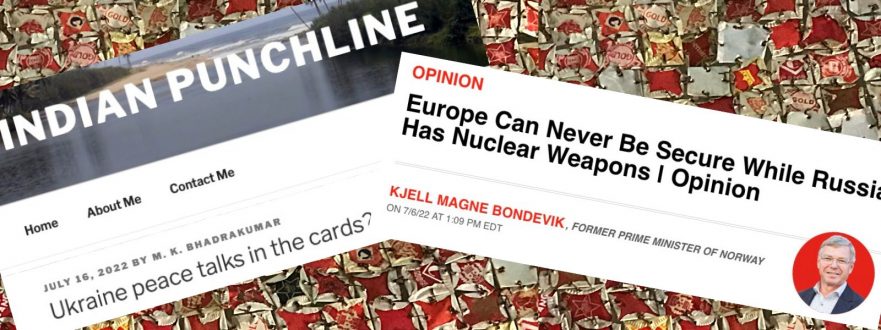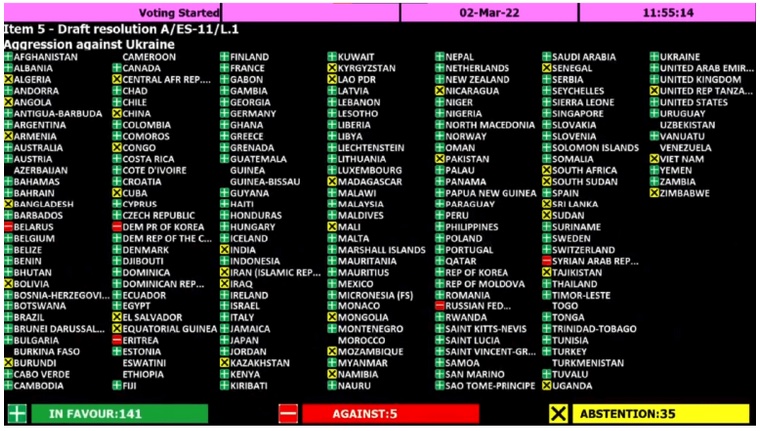by Helena Cobban
We’re pleased to cross-post this article by our president, Helena Cobban. It was originally published on her personal blog, here.
I want to note two recent articles that deal with key geopolitical aspects of the ongoing crisis in Ukraine. The first is “Europe Can Never Be Secure While Russia Has Nuclear Weapons”, which former Norwegian PM Kjell Magne Bondevik published earlier this month in Newsweek, and the second is “Ukraine peace talks in the cards?” by the super-smart retired Indian diplomat M.K. Bhadrakumar.
Bondevik’s piece presents a punchy but interesting take on the issue of how people in “the West” should respond to the sometimes crude threats of nuclear use that Russian President Vladimir Putin and some of his top officials have made, in connection with the fighting in Ukraine. Bhadrakumar’s piece looks at some intriguing evidence that, though U.S. Pres. Joe Biden and his Secretary of State have continued to issue the same kind of bellicose, anti-Russian rhetoric they have maintained almost continuously since February 24, at the more “functional” level of economic/trade policy, Washington has been making some concessions to Russia’s concerns. (His conclusion that these concessions might augur some return by Washington to active diplomatic engagement with Moscow may be a bit of a stretch? But let’s see.)
So, turning to Bondevik’s article first, it is important to remember that Norway is a key, long-time member of NATO. So the fairly strident headline of his piece is not surprising; and nor is that of his opening paragraph:
Russia has threatened to use nuclear weapons. Not in defense, not to maintain stability, but to coerce and intimidate: to facilitate its invasion of Ukraine, to constrain the international community’s ability to respond, and to provide a cover for war crimes. In the lead up to last month’s NATO summit in Madrid, Russian President Vladimir Putin talked about placing nuclear weapons in Belarus. These actions are not something we should tolerate or shrug off. They constitute an immediate and appalling threat to all of us.
Russia’s actions, he later argues, “have turned our understanding of nuclear deterrence on its head.” Then this:
The Ukraine crisis has shown us that nuclear deterrence is a ridiculously cumbersome tool for dealing with contemporary security challenges. Confronted with the invasion of a European country by a nuclear-armed aggressor, NATO’s strategic choices essentially boil down to watching in impotent horror, or ending the world. More, newer, smaller or differently-deployed nuclear weapons would do nothing to change this.
Regardless of what NATO does, Europe can never be secure while Russia has nuclear weapons… Any resolution of the current security crisis will only endure if it involves the total elimination of Russia’s nuclear weapons.
But here’s his kicker:
Any realistic approach to eliminating Russia’s nuclear weapons implies a negotiated elimination of all nuclear weapons, worldwide… While any state has nuclear weapons, no state is safe.
NATO, Europe, and the entire international community must therefore urgently renew and reinvigorate serious multilateral efforts to eliminate nuclear weapons completely—in Russia and worldwide.
And he gets specific in what he calls for. It means, he writes, “implementing long-neglected commitments made under the Nuclear Non-Proliferation Treaty (NPT).” And most immediately, “it means dropping opposition to the U.N. Treaty on the Prohibition of Nuclear Weapons (TPNW), and actively supporting that treaty’s mission.”
Hurrah! This is precisely what Just World Educational called for in the “Policy Recommendations” we presented as part of the report we issued back in April on the consultations we’d held on the Ukraine Crisis. Seven great antiwar organizations, including Code Pink, World Beyond War, and Veterans for Peace, endorsed our policy recommendations… But having this guy, Kjell Magne Bondevik present these two same conclusions publicly is extremely important.
Bondevik was PM of Norway from 2001 through 2005. He was preceded and followed in that position by a character called Jens Stoltenberg who later went on to occupy his present post as NATO’s (always hawkish) Secretary General. It probably shouldn’t need stating that the two men come from different parties. Bondevik is a Christian Democrat and also, fwiw, an ordained Lutheran minister.
Bravo, Mr. Bondevik!
The other article I want to note here is the latest essay by the amazingly prolific (and always thoughtful) M. K. Bhadrakumar. He notes that while Biden and Secretary of State Blinken have maintained their ostentatiously huffy and undiplomatic, “no contact”, behavior toward Russian officials participating in international gatherings, quietly behind the scenes Treasury Secretary Janet Yellen has– presumably with the president’s blessing?– been cutting the Russians significant slack regarding a number of thorny trade issues.
The first such issue he cites is that of the “grain corridor” agreement that Turkey and the UN were able to negotiate with apparent success last week. Under this agreement, Ukraine would remove the maritime mines with which it had been protecting its Black Sea ports from possible Russian naval attacks, and in return Washington would lift the sanctions that it had placed on Russian shipping, at least for those ships plying the Black Sea-to-Med grain trade.
On two other economic issues, too, Bhadrakumar saw an easing of the previously tight sanctions that Washington had been urging. These were the matter of rail and trucking connections between the main body of Russian land and its sovereign enclave on the Baltic, at Kaliningrad, and that of the vital parts needed to restore the passage of Russian natural gas to Germany, through the NordStream-1 pipeline.
On the Kaliningrad rail- and truck-lines, it was NATO and EU member Lithuania that initially blocked the lines in mid-June, as part of the sanctions regime that the EU had imposed on Russia to protest Russia’s invasion of Ukraine. Russia protested very forcefully and threatened to reopen the links with its Kaliningrad territory by force. Last week, the EU allowed a partial waiver of the sanctions regime for transit traffic between Russia and Kaliningrad.
On the matter of NordStream-1, Canada had been prohibiting the export to Russia of a turbine vitally needed for the smooth operating of the pipeline, but received a waiver from Washington to allow it.
Bahadrakumar is quite right, I think, to surmise that none of these sanctions waivers would have been allowed without a go-ahead from Washington. However, regarding which agency in Washington would have given that nod, I think he may well be wrong to say it was the Treasury Department, and its head Janet Yellen. I’m pretty certain that for several years (decades) now, the enforcement of the literally hundreds of sanctions orders that Washington has issued against countries it disapproves of has been in the hands of the “Justice” Department, not Treasury.
But still, one of his broader points is an interesting one, and one that has received very little note in the corporate media here in the United States. Namely, that Washington has been forced to dial back some of the more extreme of the sanctions it has tried to impose on Russia, and has done so because many countries inside Europe and far beyond are not prepared to suffer the pain those sanctions would inflict on them. Indeed, the pain that the sanctions have already started to inflict on them. And that these retreats by Washington are indicative of a significant waning of the hegemonic power Washington for so long enjoyed within the internationalk system.
Bhadrakumar also noted this:
Even a close friend of the US such as former Israeli foreign minister Shlomo Ben-Ami is advising that “Russia has generally managed to stem the tide” on Ukraine’s battlefield and a “similar shift in Russia’s favour may well be playing out geopolitically,” which would mean that “the consequences of remaining on the current path could prove far worse.”
I guess my comment on that is that there have been numerous strong indicators that the general tide of Washington’s geopolitical power has been ebbing over the past 4.5 months.
Back on March 2, when the UN General Assembly held a “Uniting for Peace”(non-binding) meeting that had been urgently convened to build international condemnation of Russia for the invasion, the resolution to that end passed by 141 votes to 5, with 35 abstentions. But the abstentions included the world’s two most populous countries, China and India, along with South Africa and a number of other bellwethers of Global South leadership.
The Biden-Blinken team later saw such other international fiascos as the failure of its much-heralded “Summit of the Americas” in early June, and its failure to persuade OPEC to cut its ties with Russia.
On the other broad point made by Bhadrakumar, as indicated in his headline, I am not sure we have enough evidence yet to conclude that– from the Washington end– any “Ukraine peace talks” are yet “in the cards”. Bhadrakumar does note helpfully that, from Moscow’s end, there have been some signs of renewed interest in peace talks with Ukraine.
It would be great if this could happen, obviously. And as with the whole of the “grain corridor” negotiation, Turkey could be a key intermediary. Bhadrakumar noted that Putin and his Turkish counterpart, Pres. Rejep Teyyip Erdogan, will be meeting in Tehran tomorrow, Tuesday. Let’s see if anything comes of that.
But what an interesting meeting that will be, in Tehran, anyway…


